Religious Studies > SOPHIA Milestone > REL 101. Sophia Milestone. Unit 1 Challenges. 100% Correct. (All)
REL 101. Sophia Milestone. Unit 1 Challenges. 100% Correct.
Document Content and Description Below
Challenge 1 1. In the middle of a road trip, Ivan’s car broke down outside of a small town. As he waited for his car to be fixed, he glanced around the mechanic’s waiting room, looking for some... thing to do. The only reading material in the room was a Bible. Ivan decided to wait at a nearby diner instead. As he walked, he wondered about the practice of offering a Bible to waiting customers. Why had the sight of it bothered him? Ivan wasn’t committed to believing in either the existence or the nonexistence of God, since he felt that it could not be proven either way, so it was curious that he’d had a reaction at all. Given Ivan’s statements about his thoughts about God, he would be considered to be a(n) (A) agnostic . 2. As he settled in at the diner, Ivan noticed a group of men come in, one of them wearing a turban. Ivan wondered what religion the turban signified. He thought it was one of the Eastern religions. Religions can be categorized in many ways, including Eastern and Western. Select two religions that are classified as Eastern religions. Islam Sikhism Roman Christianity Judaism Confucianism 3. As he was eating, Ivan noticed another group come into the diner: a couple with young children, and an older couple, the male wearing a skullcap that Ivan identified as a kippah. Ivan had always been interested in differentreligions and cultures, so he was pleased to see the level of diversity in such a small town. Determine whether each statement is “True” or “False” in the context of Judaism. = Correct Answer = Incorrect Answer True False Judaism is a henotheistic religion. Practitioners of Judaism believe that the Jewish people are descended from Abraham. Judaism is over 3,000 years old. Correct! GO TO THE NEXT QUESTI 4. Another group of people entered the diner and Ivan recognized the tow truck driver who had towed his car. They nodded to one another and Ivan waved the driver over to join him. As they got to talking, Ivan mentioned his observations about the diversity of religions in the small town. Henry, the tow truck driver, shared that he had gone to seminary and was very interested in the study of religions. Since Ivan had loved his religions classes in college, this was something that the two men had in common. Individuals who study religions believe that it is important to apply certain principles when examining other religions. One important principle states that you try to refrain from judging a religion when you are studying it. This principle is called the principle of (A) objectivity .5. As Henry and Ivan talked further, they began discussing the different ways that people approach studying religions, from the faithful to the scholarly to the merely curious. There are many academic approaches to studying religions. One approach, which focuses on the experience of religion and how it manifests in the world, is called the (A) phenomenological approach. 6. One thing that they both agreed on was that the age-old questions, such as ‘Where did I come from?’ and ‘Why am I here?’ could not be answered academically. Ivan remarked that many religious scholars had been trying to answer these questions for hundreds of years. Match the concepts below to the name of the associated religious scholar. Terror before the sacred Utter Dependence Ultimate Concerns A.Van der Leeuw B.Otto C.Schleiermacher D.Tillich 7. Their conversation drifted to how different religions approached the same eternal questions. They both found it remarkable that there were some many similarities between some religions, whereas others offered drastically different approaches. Pair each religion with the correct description. Judaism Confucianism Islam B C D B D AA. This religion believes that Mohammed is the prophet of God and that Abraham, Moses, and Jesus are lesser prophets. B. This religion is over 3,000 years old and is one of the world’s oldest monotheistic religions. C. This religion is often described as henotheistic and identifies four goals in life. D. This religion has its origin in 5th century writings and emphasizes loyalty to the family and to the government. 8. As they considered these similarities and differences, Henry started sketching on a paper placemat, showing how religions are typically categorized. Within the discipline of comparative religions, the most commonly used categories for religions are Abrahamic, Indian, and Taoic. Identify two Taoic religions. Shinto Buddhism Confucianism Judaism Hinduism Islam 9. Ivan argued that the religion’s approach to divinity was the most important element, so Henry passed the placemat over to Ivan. Ivan drew wobbly circles across the paper connecting similar religions, labeling each circle with the appropriate “ism”, such as monotheism, henotheism, or pantheism. Pair each term with the corresponding example.Pantheism Atheism Monotheism A. Martin has never been interested in religion because he does not think that god exists. B. Lillie thinks that there is no one god, but that the divine is a part of everything in the universe. C. Javaid believes that the universe is full of supernatural beings that influence the events of his daily life. D. Nina has always believed the there is just one god, the god that she has worshipped since childhood. 10. When the waitress came with the bill Ivan picked up the check, citing his gratitude for the interesting conversation. The mechanic appeared with Ivan’s keys and he stood up and put on his coat. The two men shook hands and Ivan walked out of the diner smiling. Ivan decided that maybe his car breaking down had not been such a bad thing after all. Religion impacts individuals, families, and society at large in many ways. Consider each statement about religion and the study of religions and evaluate whether it is “True” or “False.” = Correct Answer = Incorrect Answer True False Religion often dictates marriage structure, but it has little influence on other family roles. Most religions seek to explain the origins of B A Dhumanity. Religious scholars generally agree on the definition and origins of the word “religion.” Challenge 2 1. Family and religion have a(n) (A) symbiotic relationship, because the family supports religion by providing followers, while the religion provides a structure for family life. Religions have historically played a large part in determining the structure of (B) marriage , especially as it relates to the roles of men and women. 2. Match the correct term with its definition. sacred profane social convention A.That which is blessed B.That which is beyond the ordinary C.That which is outside the temple D.A widely accepted custom or belief 3. Match the term to the correct definition. B C D AThis means "surrender," and is interpreted to mean that followers must submit themselves to God. The second largest sect of Muslims. The Pillar of Islam that asks all Muslims to travel to Mecca at least once in their lifetime. A.Islam B.Salah C.Shiite D Hajj 4. Indicate which of the following religions belongs with the proper categorization. Shinto Christianity Hinduism A. Indian B. Taoic C. Abrahamic D. Primal 5. The sociologist (A) Emile Durkheim studied suicide rates of Protestants and Catholics in a seminal work on the sociology of religion. 6. The philosophy of religion (A) asks questions about the existence or nonexistence of God. 7. Select the two statements below that are true of the phenomenological and historical approaches to studying religion. C D B C AThe phenomenological approach attempts to answer larger and ultimately unanswerable questions. The historical-critical study of the Bible emerged in 17th century Europe. An advantage of the phenomenological approach is that one can track changes to religion over time. The history of a religion can only be studied effectively by its followers. Historical studies of Christianity have until recently focused on its development in Europe. The phenomenological approach uses a typology/categorization method. 8. Which two of the following statements are not true of Christianity? Roman Catholicism is the largest Christian sect in South America. Is divided into “western” and “eastern” branches. Founded in the first century B.C./B.C.E. “Immanuel” means “God with Us.” Jesus of Nazareth is the central figure. The Russian Orthodox Church is the major form of eastern Christianity. 9. Match each element below to its corresponding religion. Jainism Sikhism D ATaoism A. Monotheistic religion B. “Path” or “way” C. Widely practiced in Japan D. Aims to achieve “siddha” 10. Choose the most appropriate answer for each element shown below. = Correct Answer = Incorrect Answer Hinduism Islam Has multiple gods and godesses. Adherants seek liberation from from samsara. Believes in many prophets. CHALLENGE 3 1. Confucius is regarded as the founder of Confucianism. How did he believe that people could be made better? Through reading and interpreting scriptures. By foregoing dependence on material things. Through charity and almsgiving. B Through instruction in guidelines for living. By avoiding taboos. By questioning the wisdom and authority of parents. 2. The teachings of (A) Confucius , who spoke of loyalty to both family and government, has guided the conduct of many in China for centuries. Because of this, it has sometimes been useful in (B) exercising social and political control. 3. Buddhism is a religion native to the (A) Indian subcontinent. Its founder, Siddhartha Gautama, is called the (B) Buddha , which means “enlightened” in Sanskrit. 4. In Buddhism the five (A) precepts are a guide on how to live well. One such guideline includes the instruction "do not abuse the mind with (B) intoxicating substances ." 5. Which two of the following terms do NOT reflect the four big questions raised by religion? Death Helpfulness Meaning Life Wonder Eternity 6. In the (A) Hebrew language, there is no word for religion that is similar to the English word, because religion is/was fully integrated into all aspects of society. 7. Because myth is beyond the limits of human logic, it is considered (A) extrarational . 8. Which of the following is a Hindu scripture? The Bible The Quran Tao te Ching The Torah The Bhagavad-Gita Deuteronomy 9. One common way to categorize religions is Eastern versus Western. However, (A) primal religions do not belong to either of these categories. 10.Abrahamic Indian Buddhism Islam Judaism Practice Milestone [Show More]
Last updated: 1 year ago
Preview 1 out of 12 pages
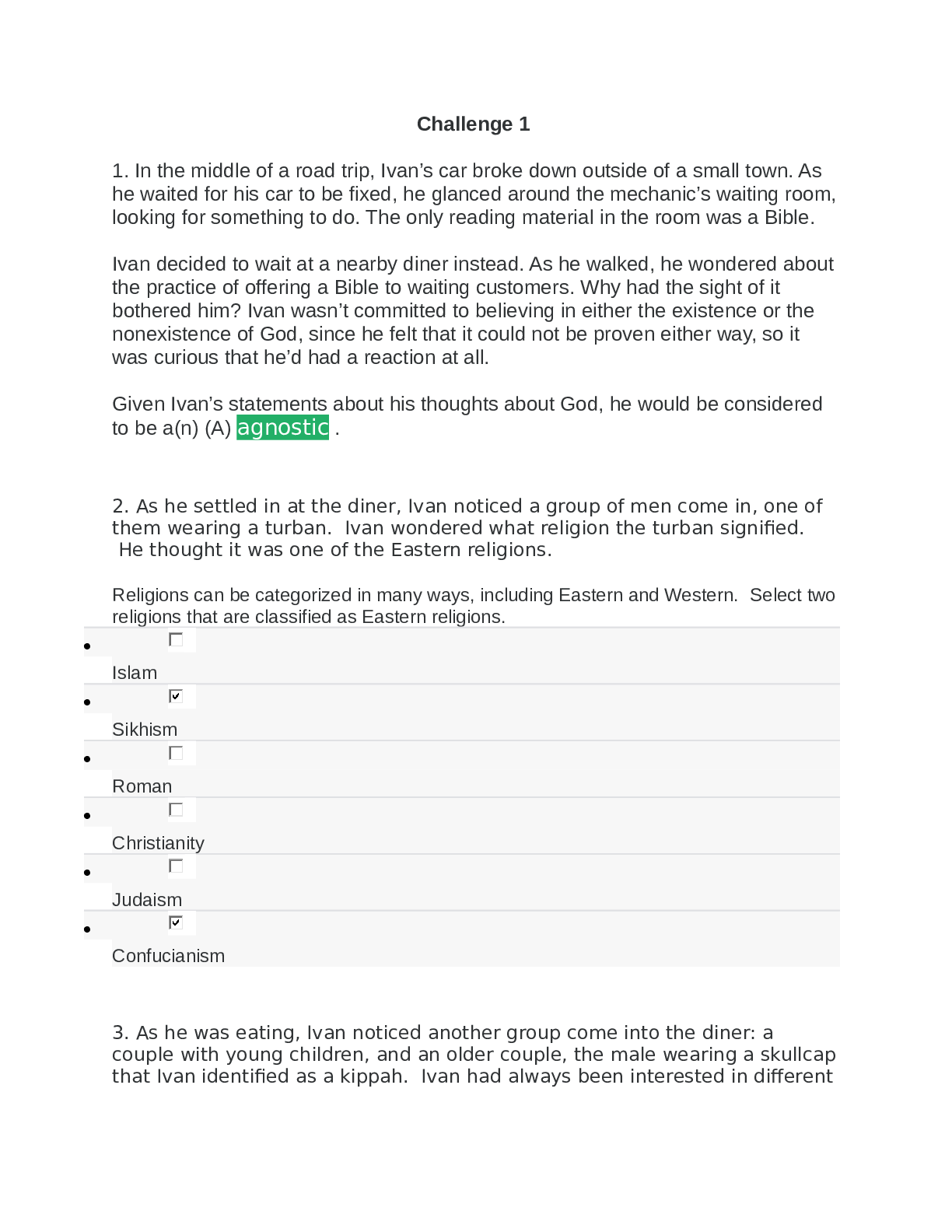
Reviews( 0 )
Document information
Connected school, study & course
About the document
Uploaded On
Mar 20, 2021
Number of pages
12
Written in
Additional information
This document has been written for:
Uploaded
Mar 20, 2021
Downloads
0
Views
162

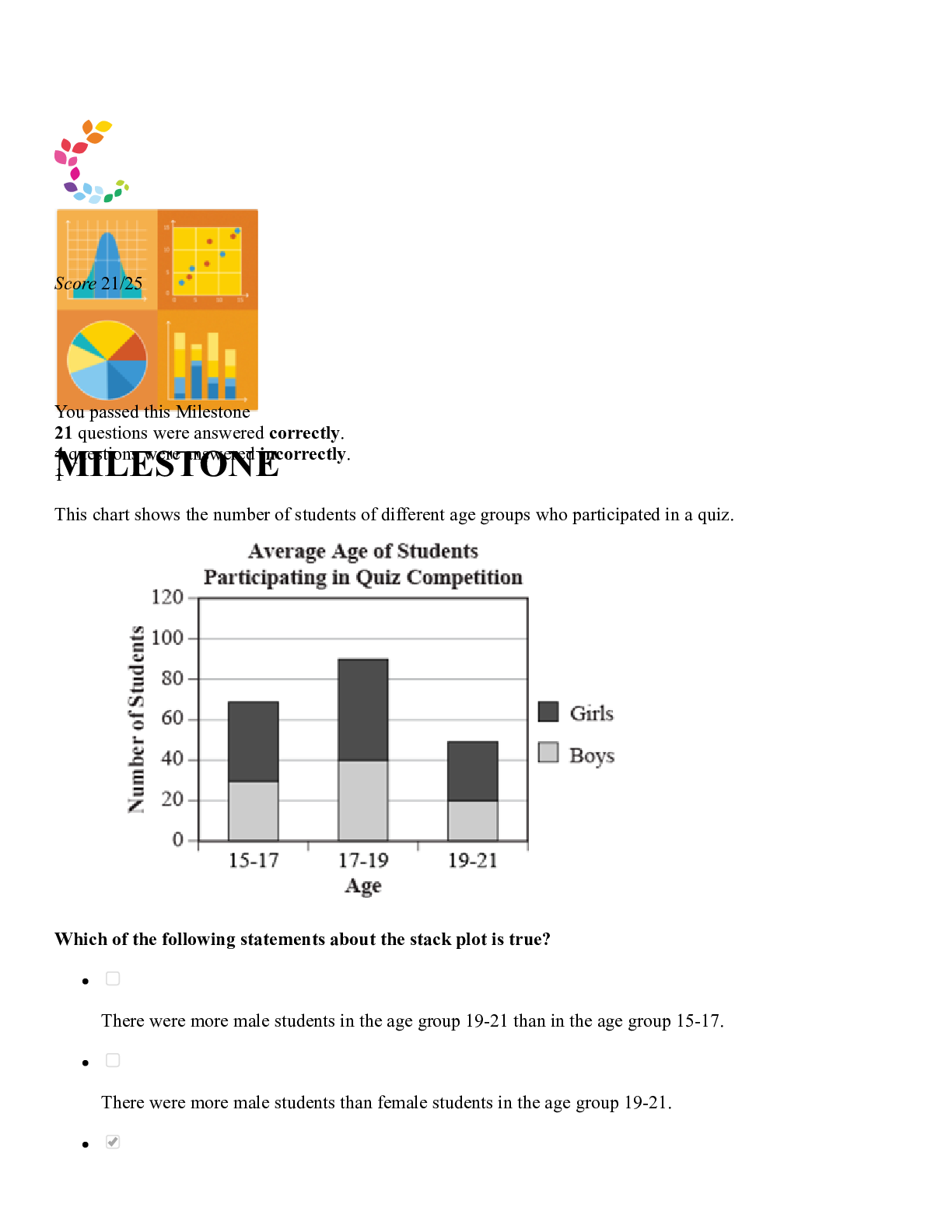
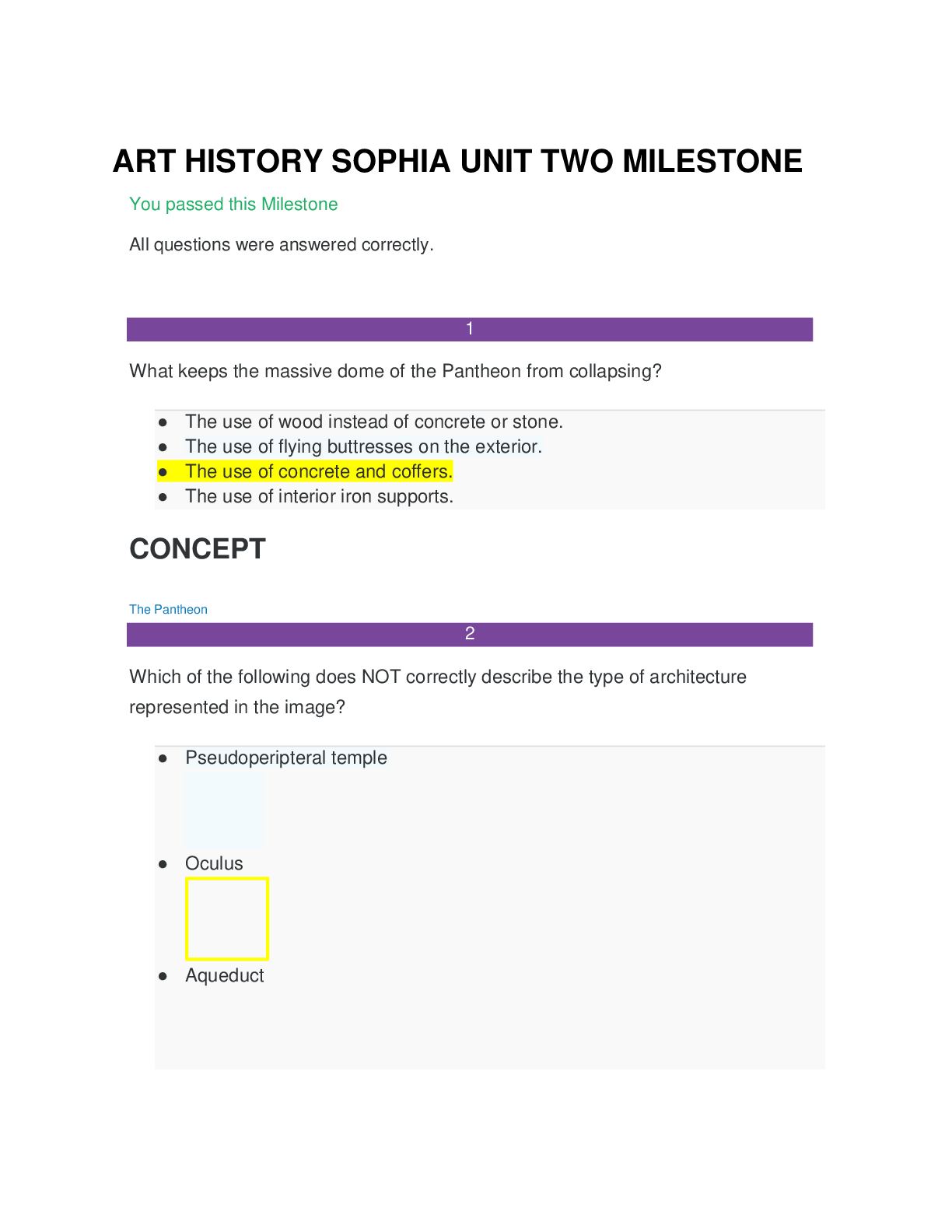
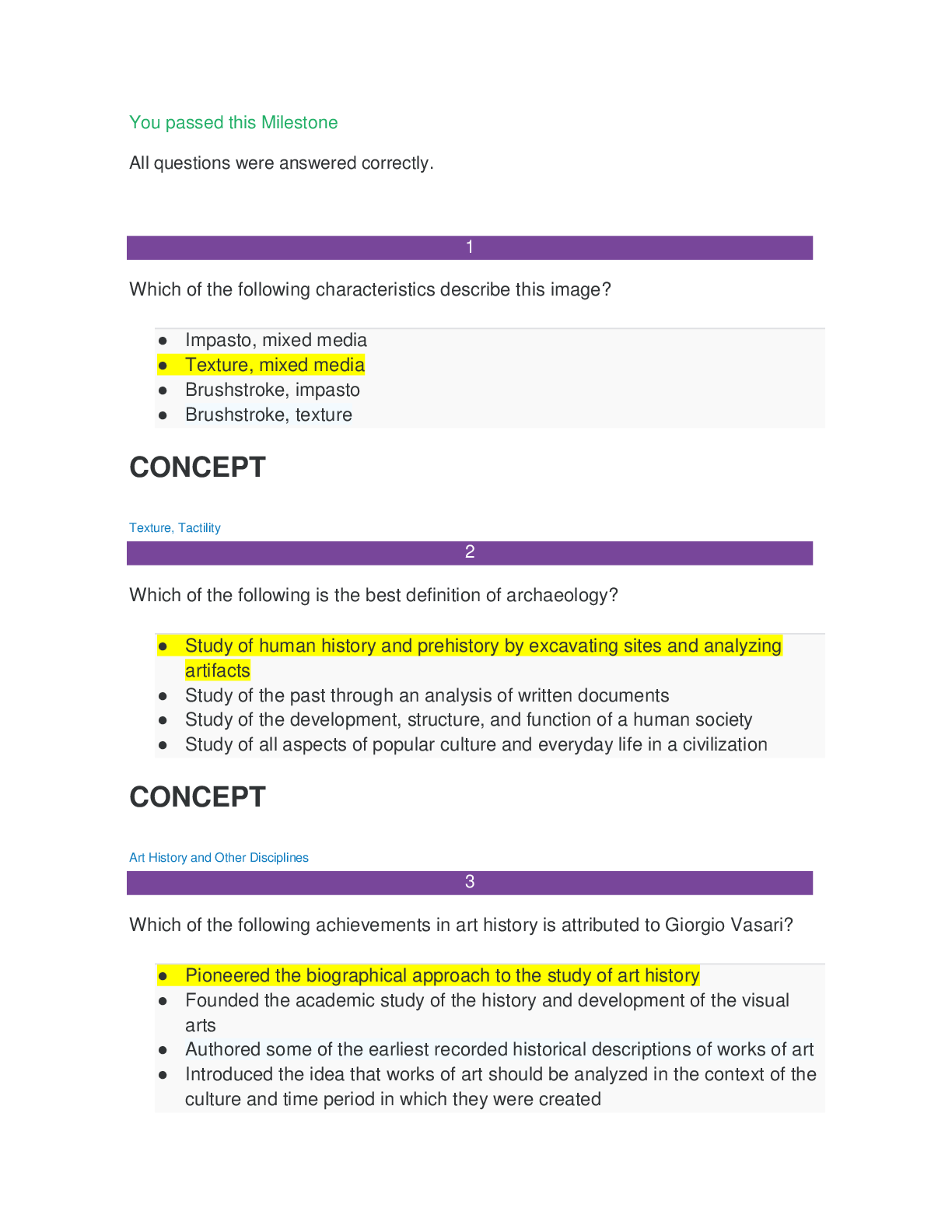
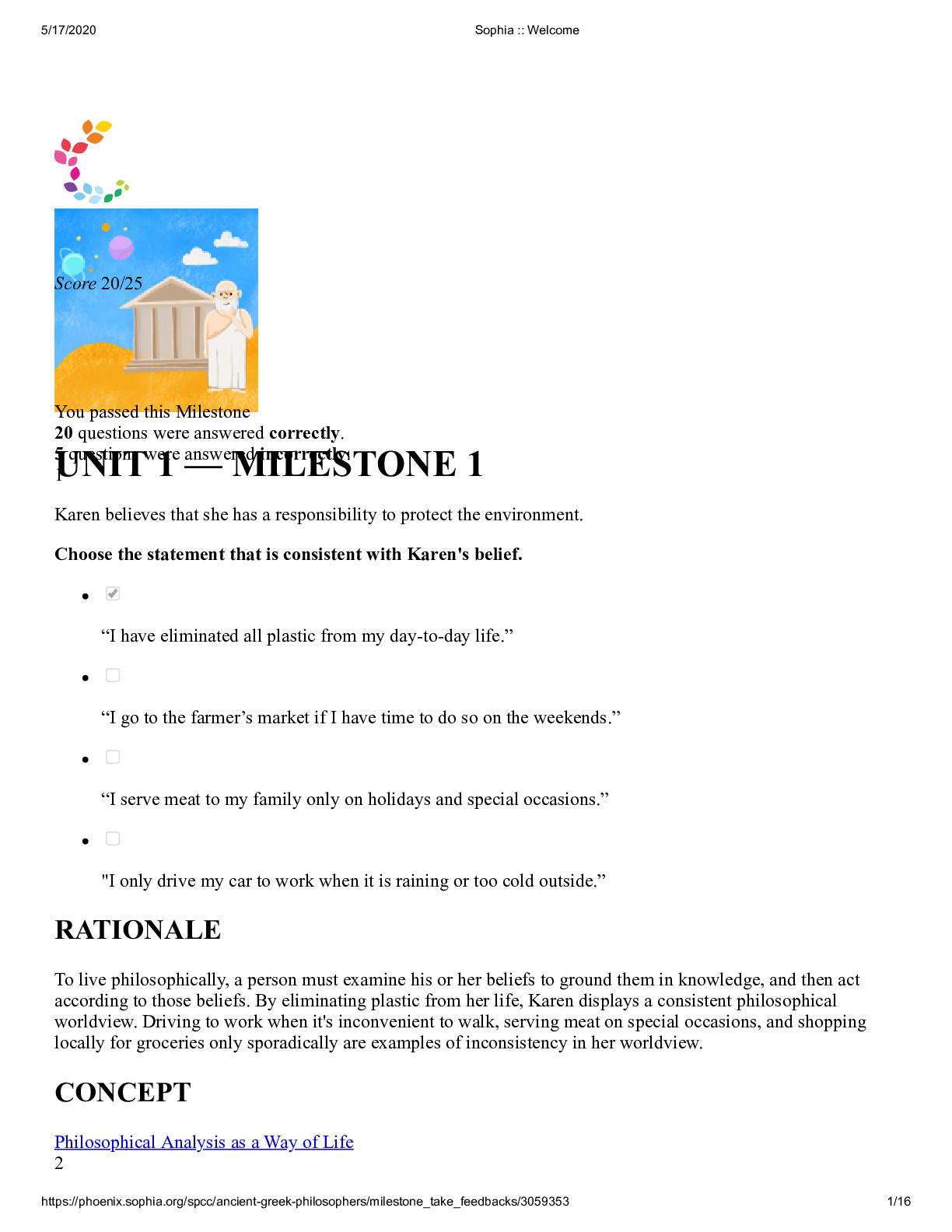
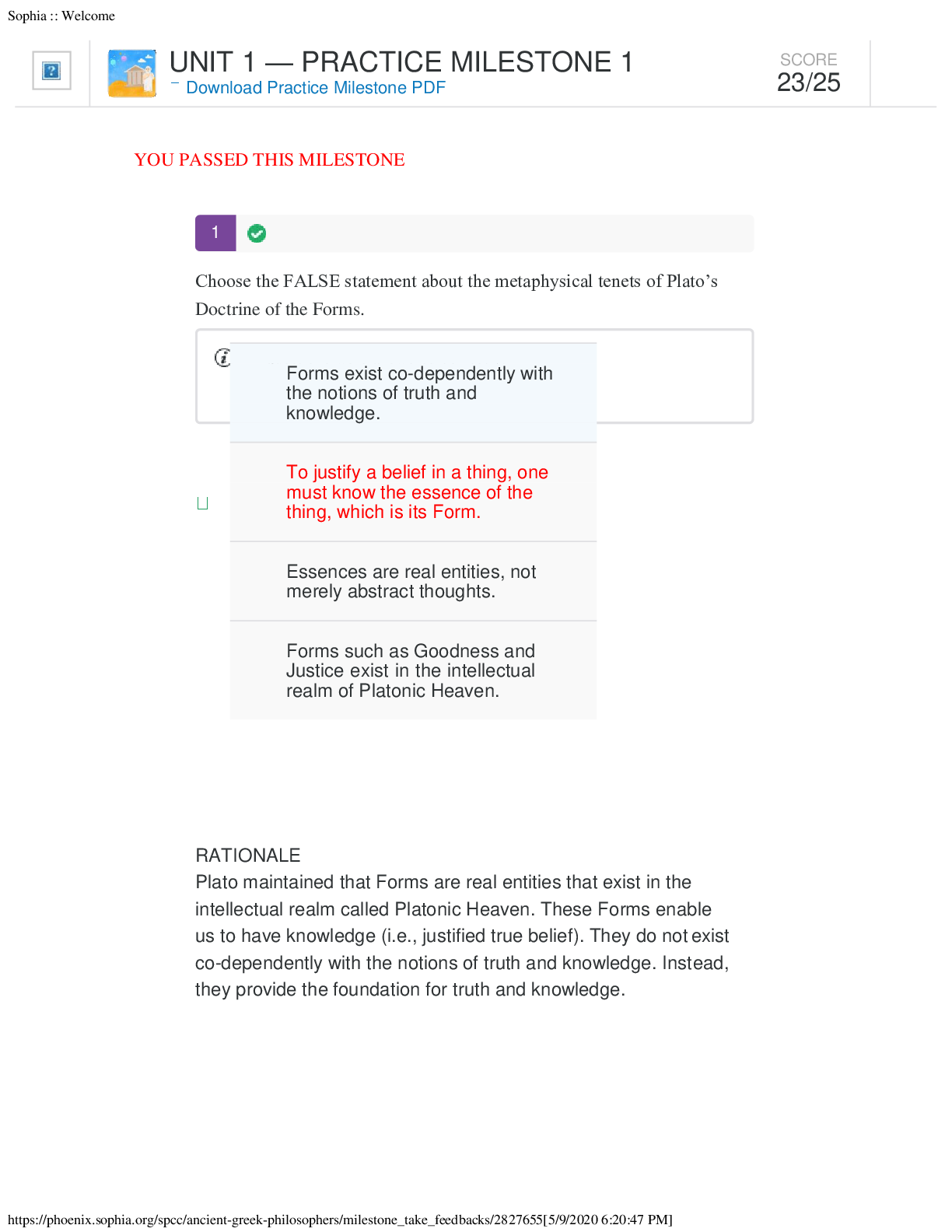
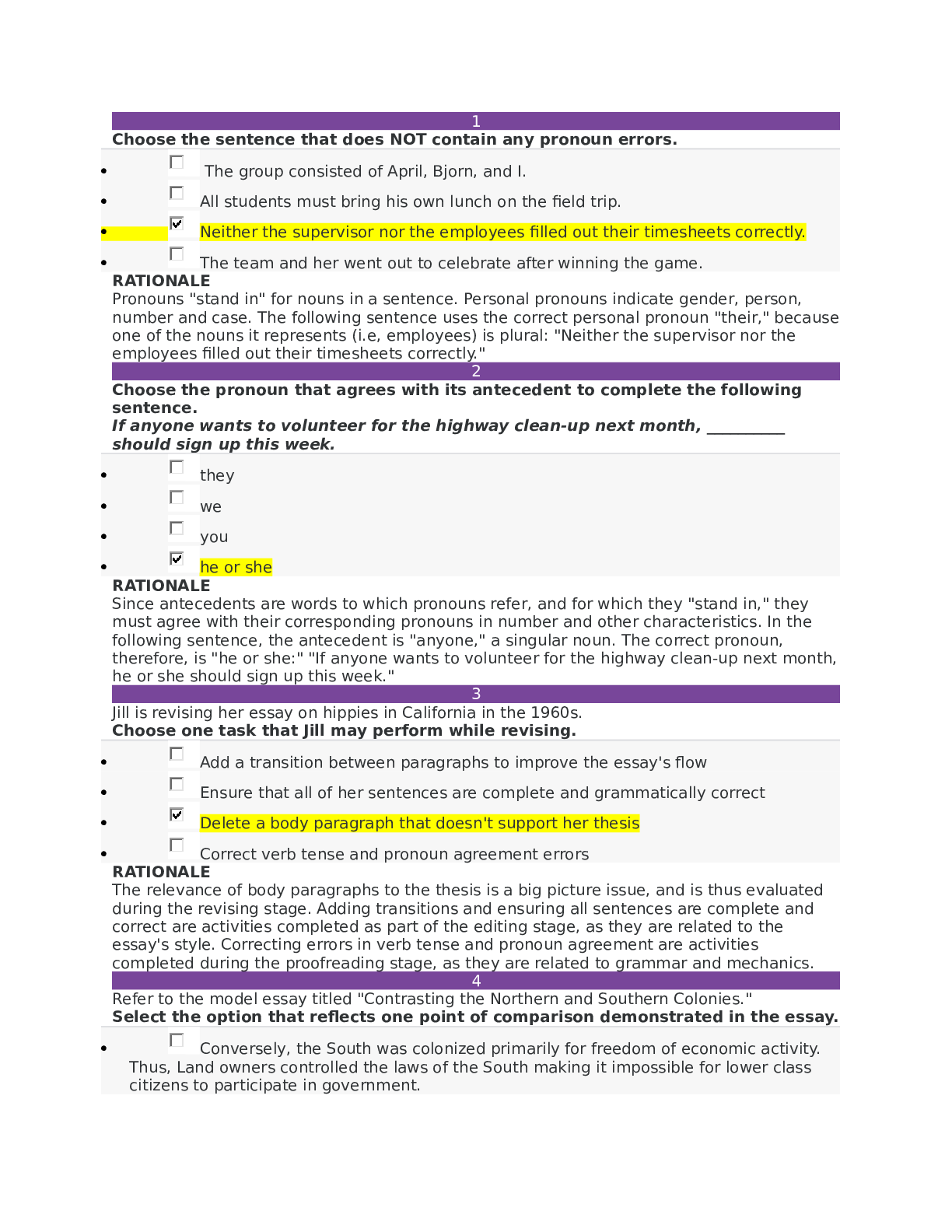
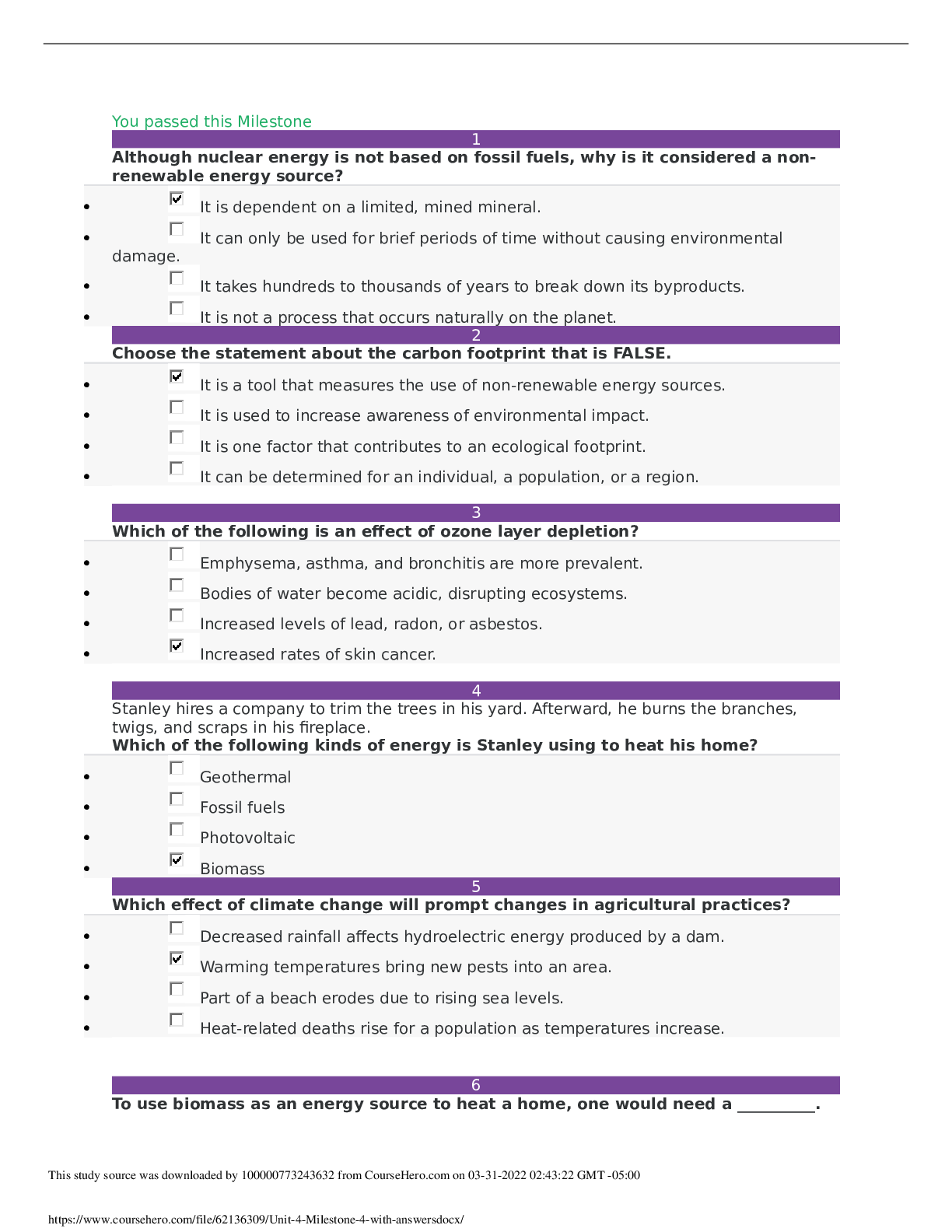


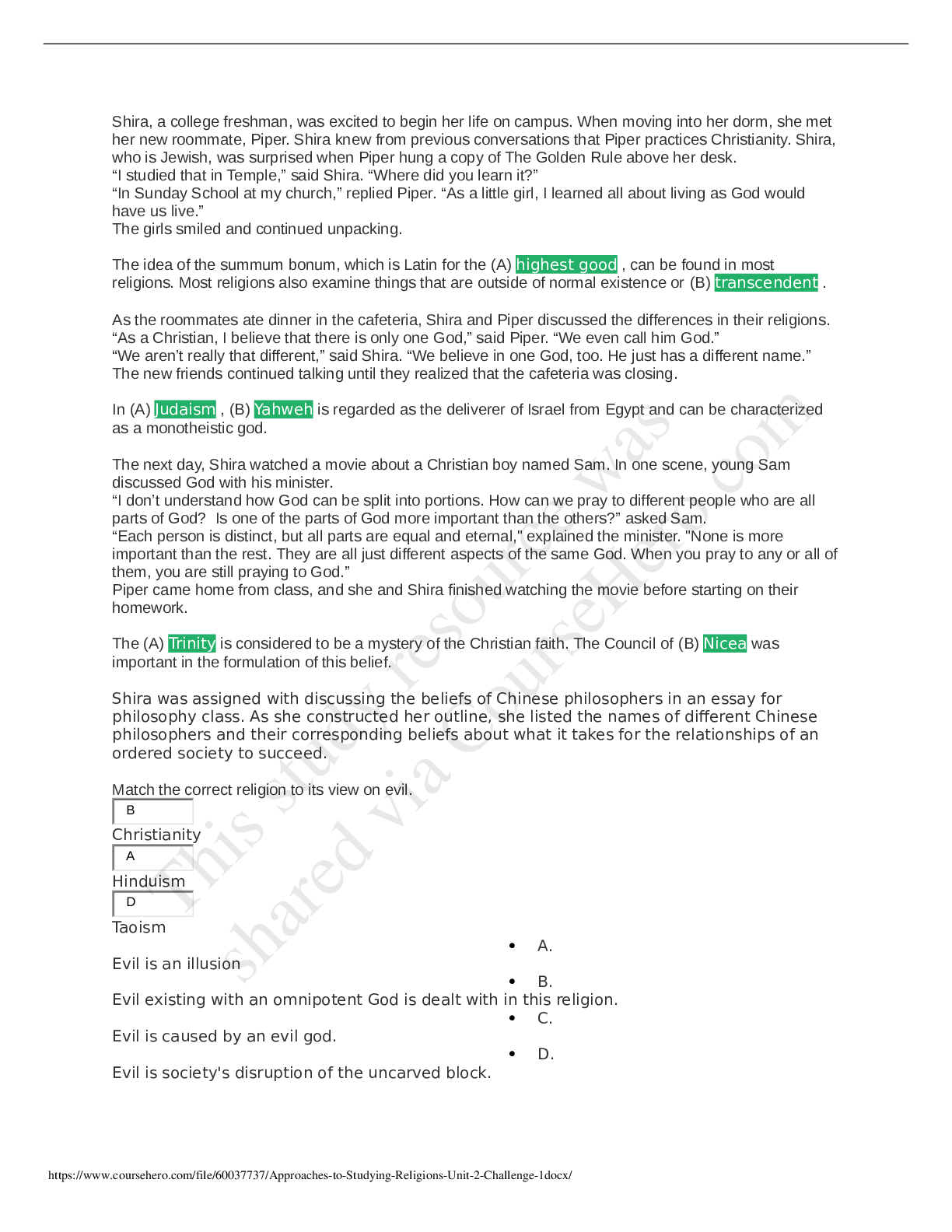

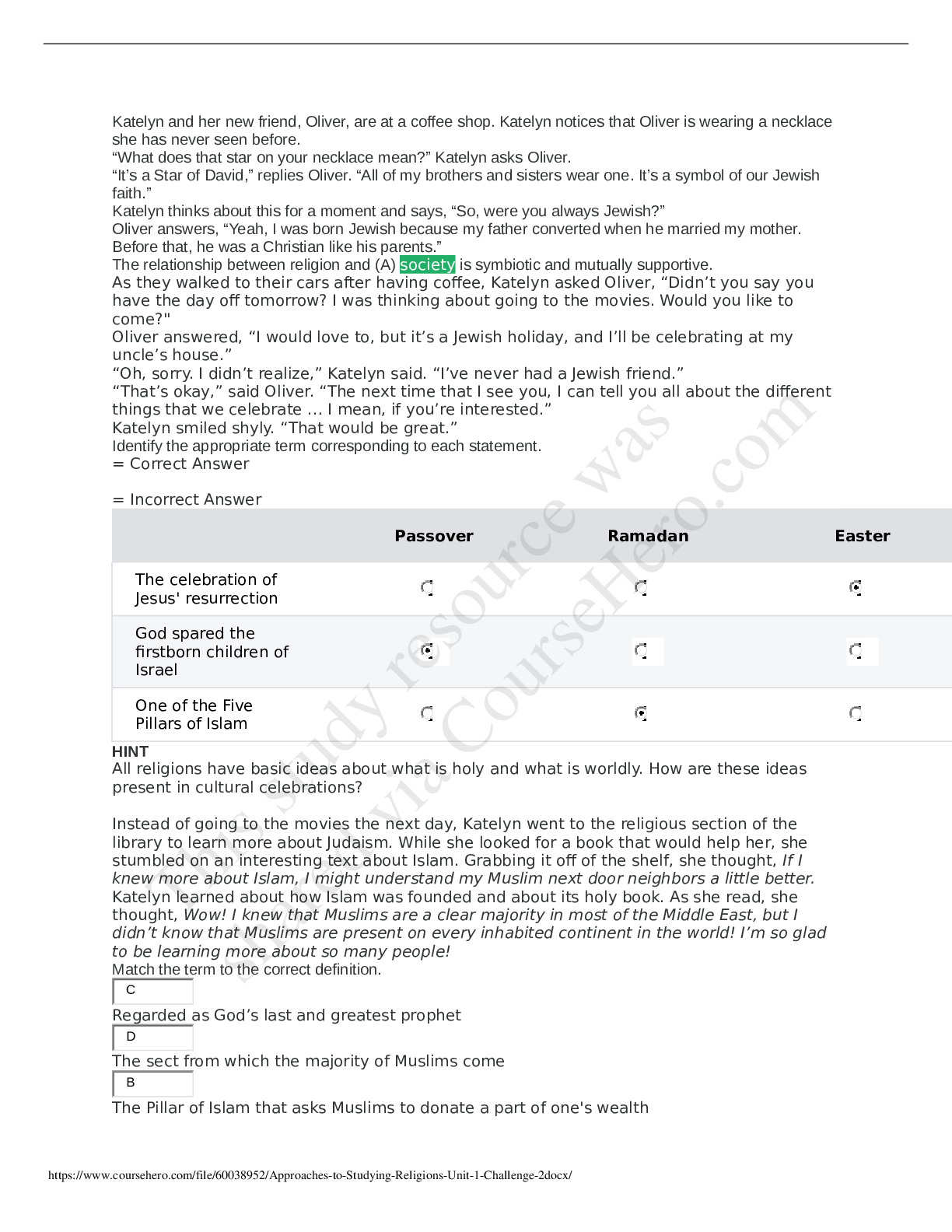
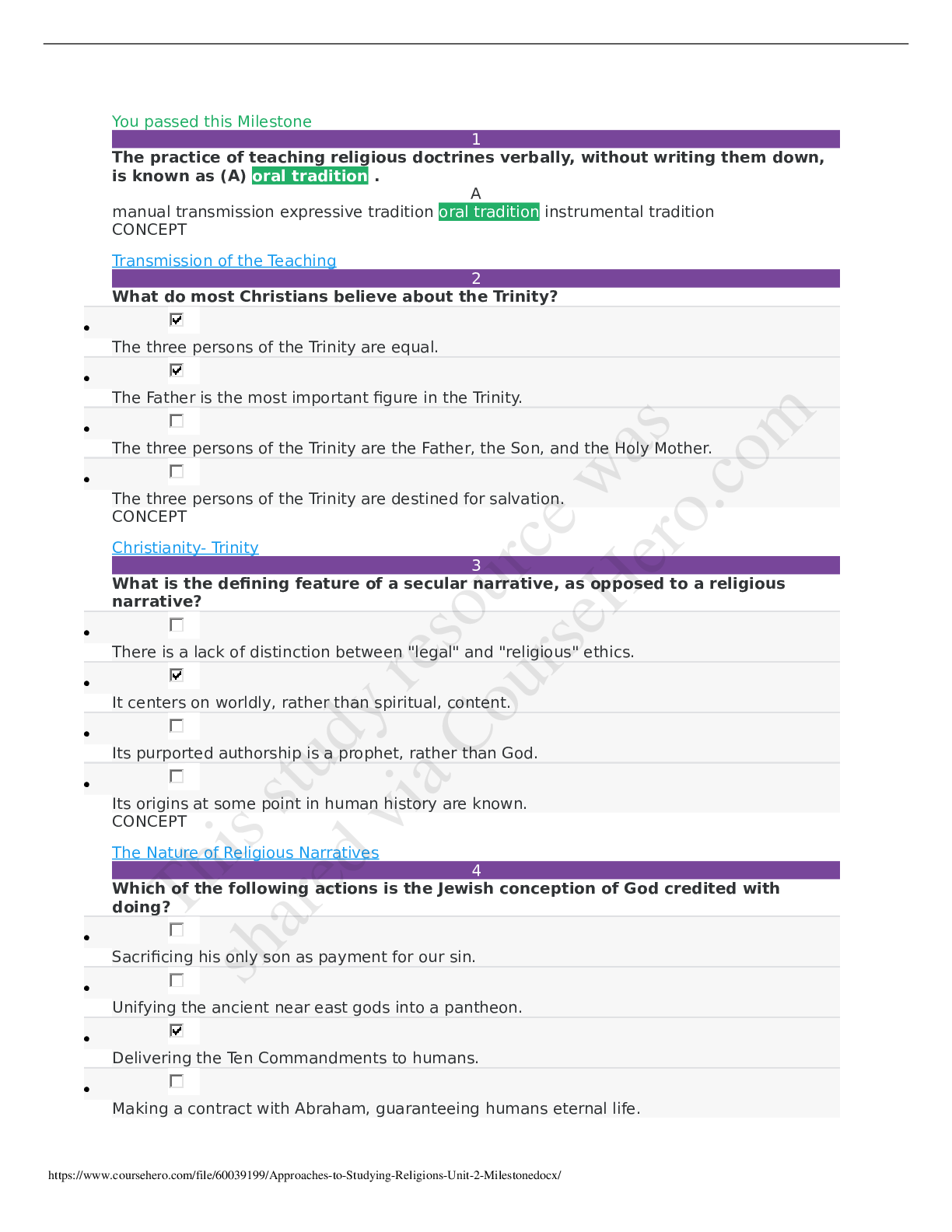

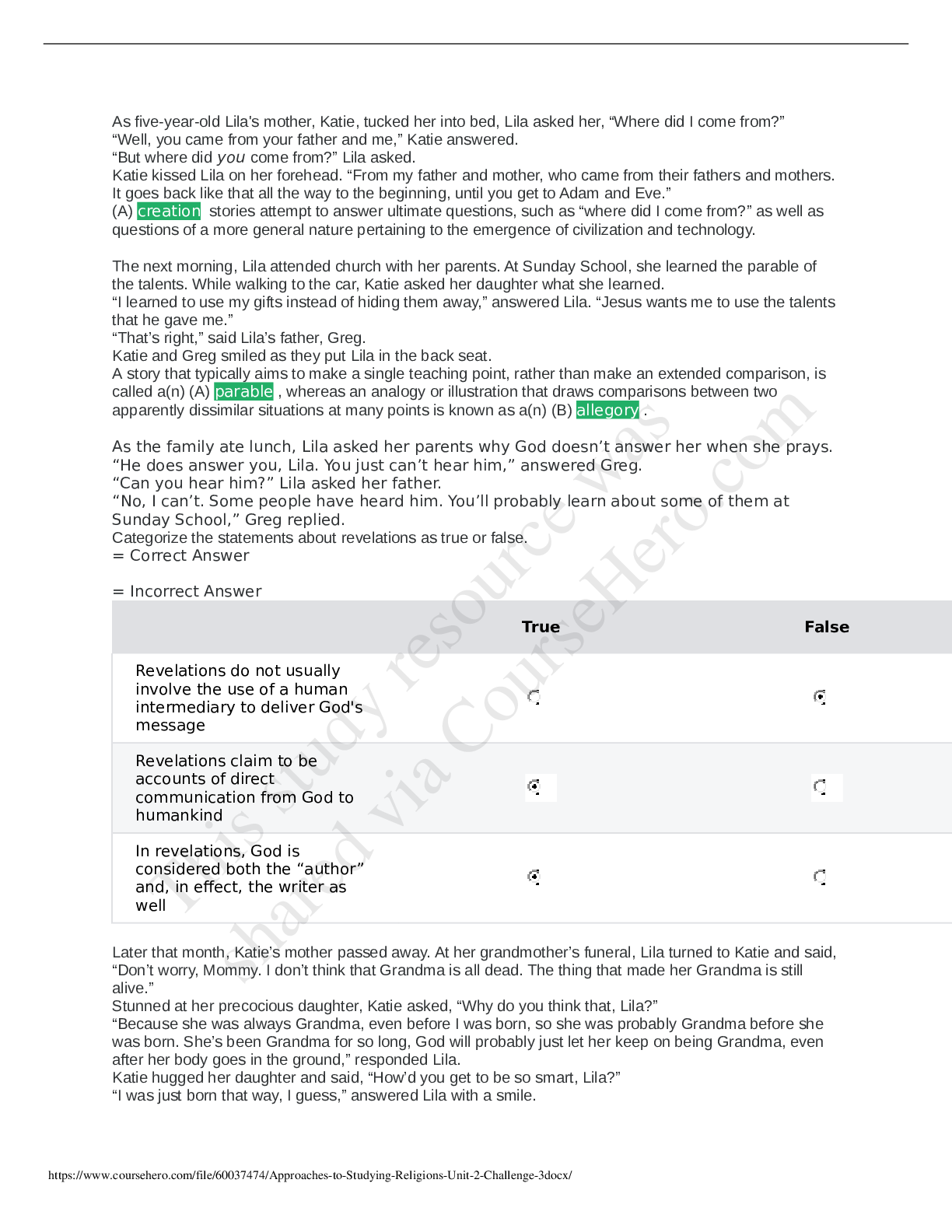
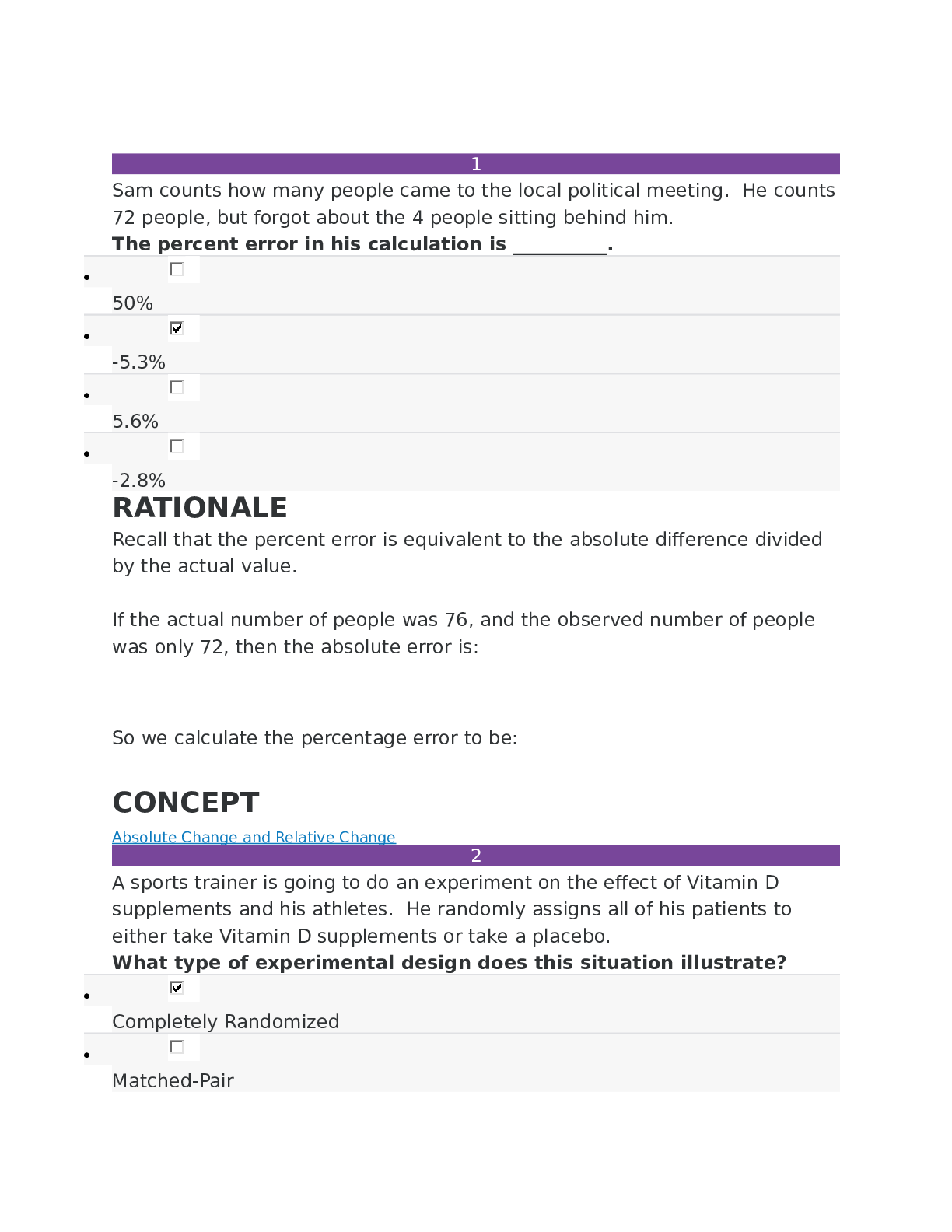

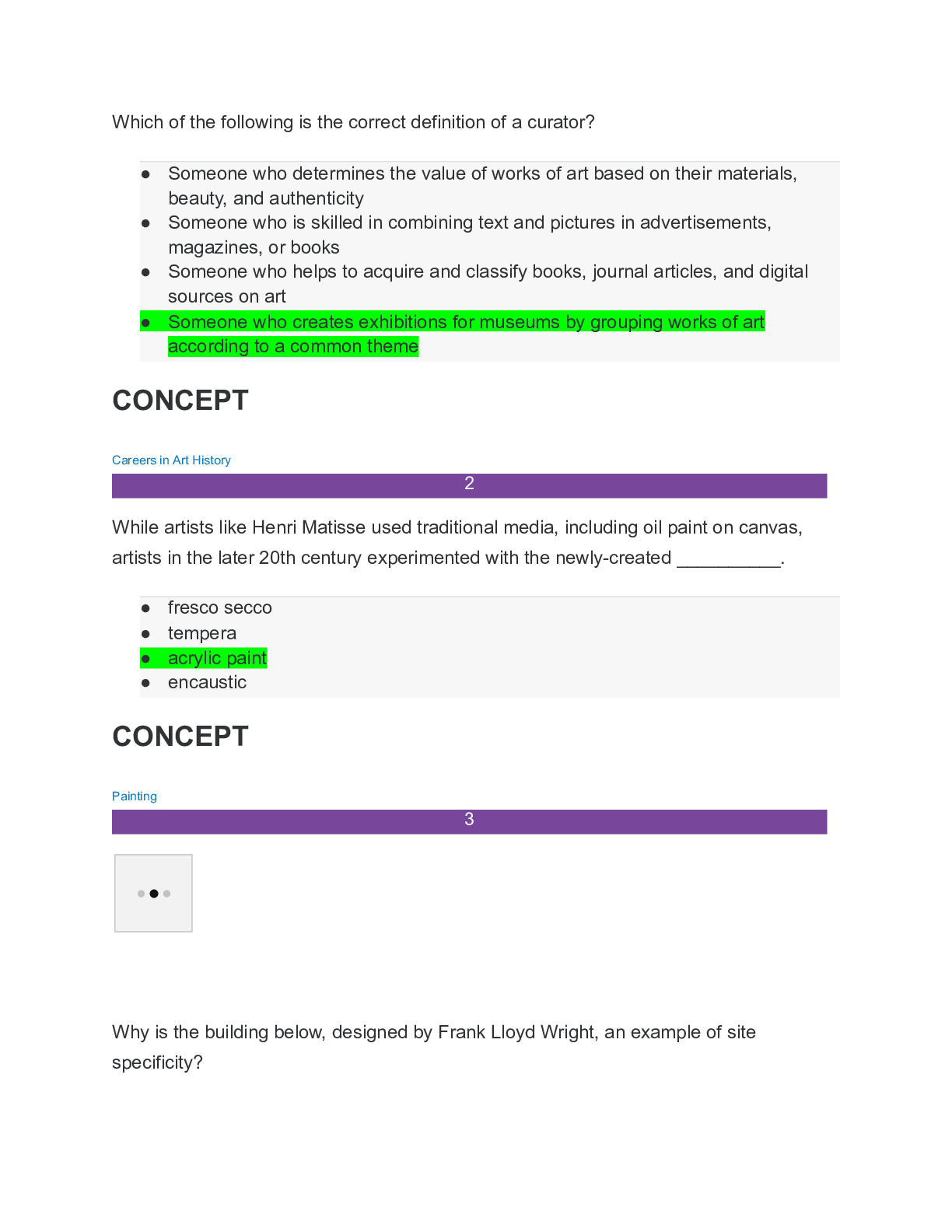
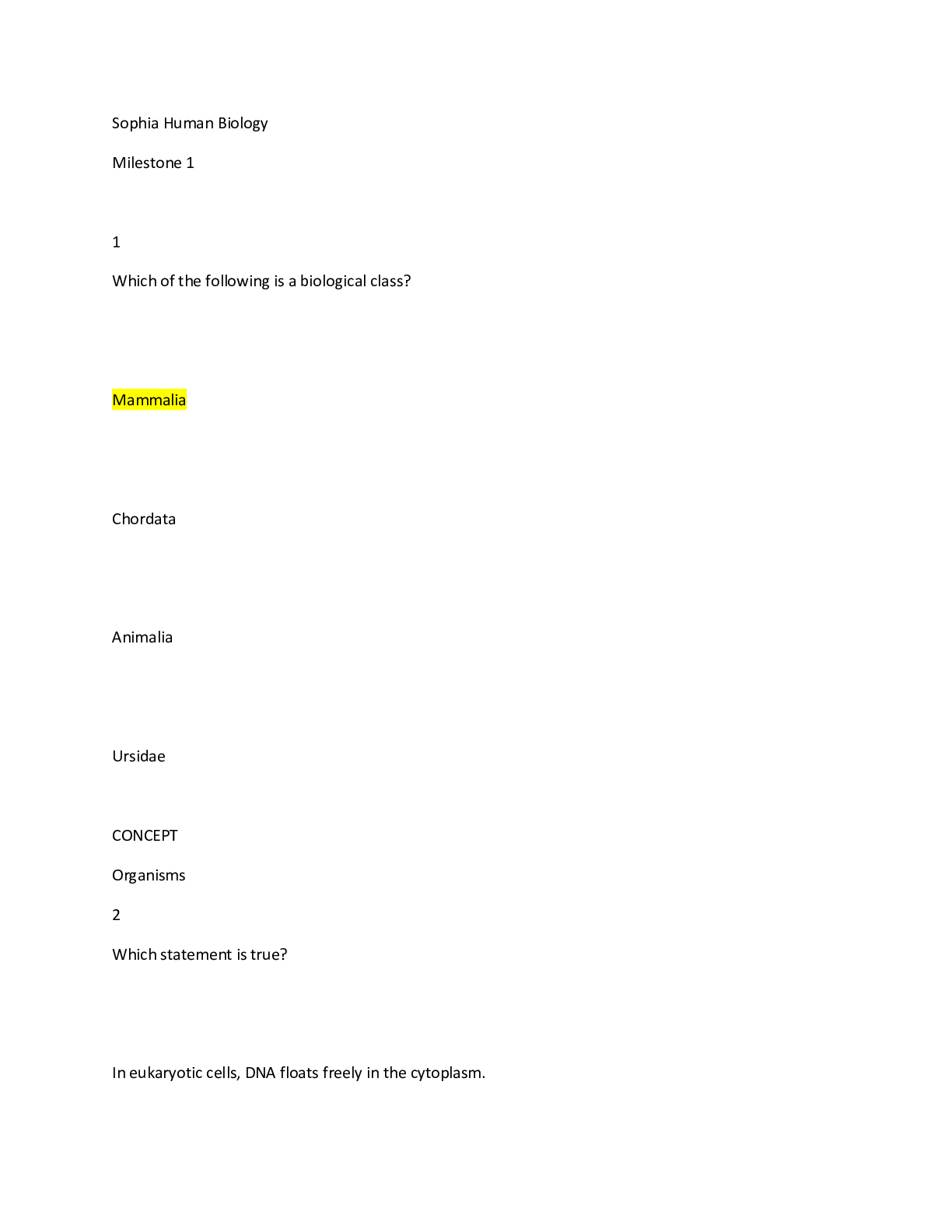
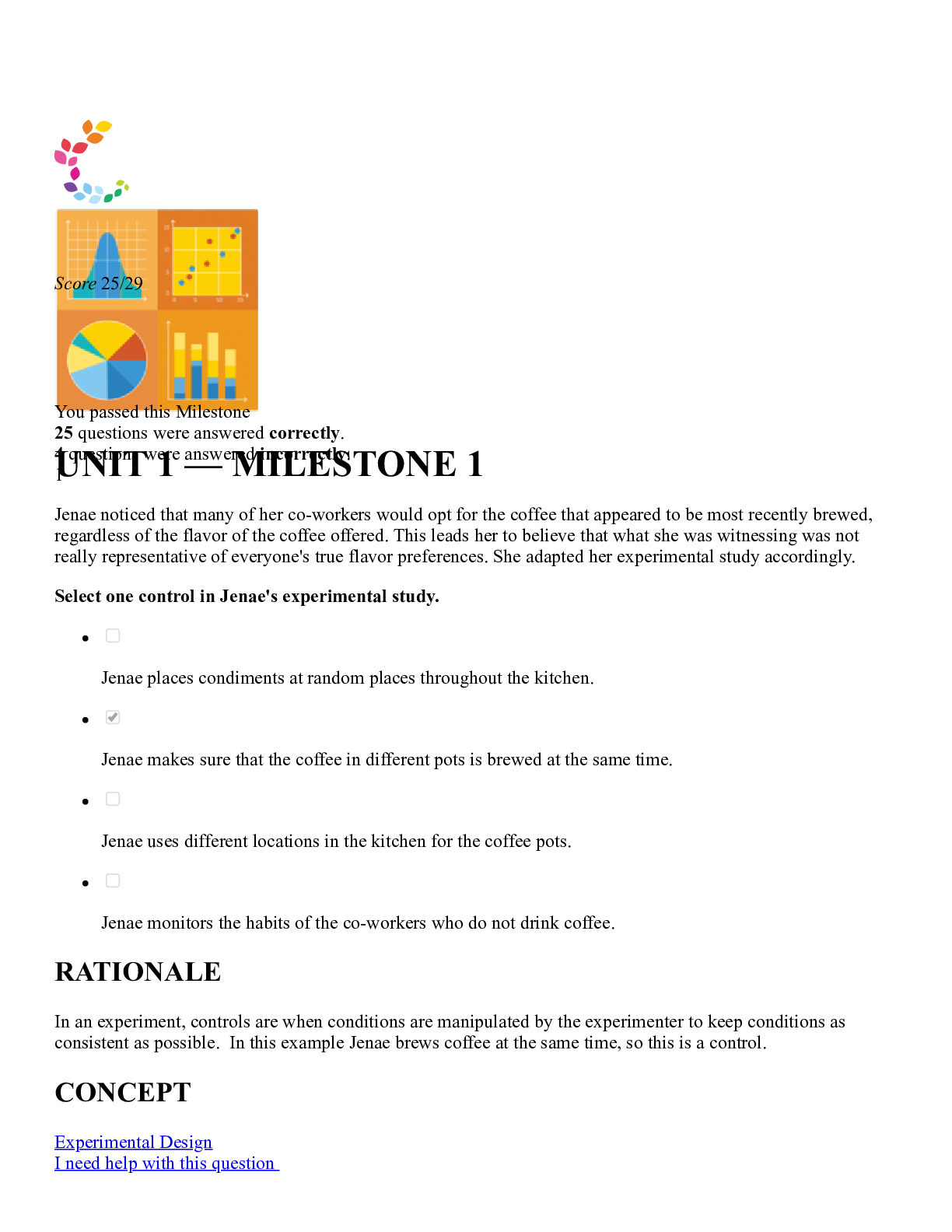
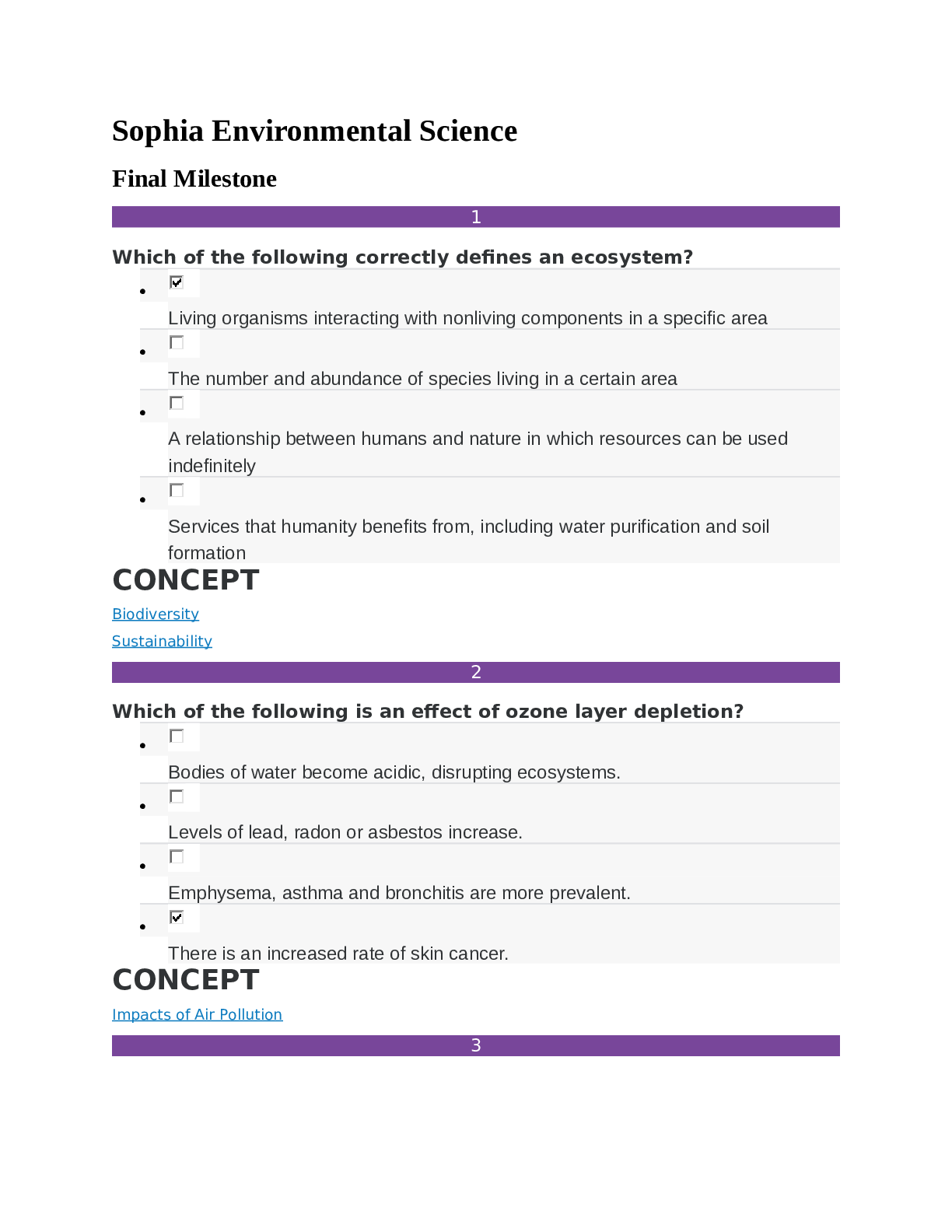
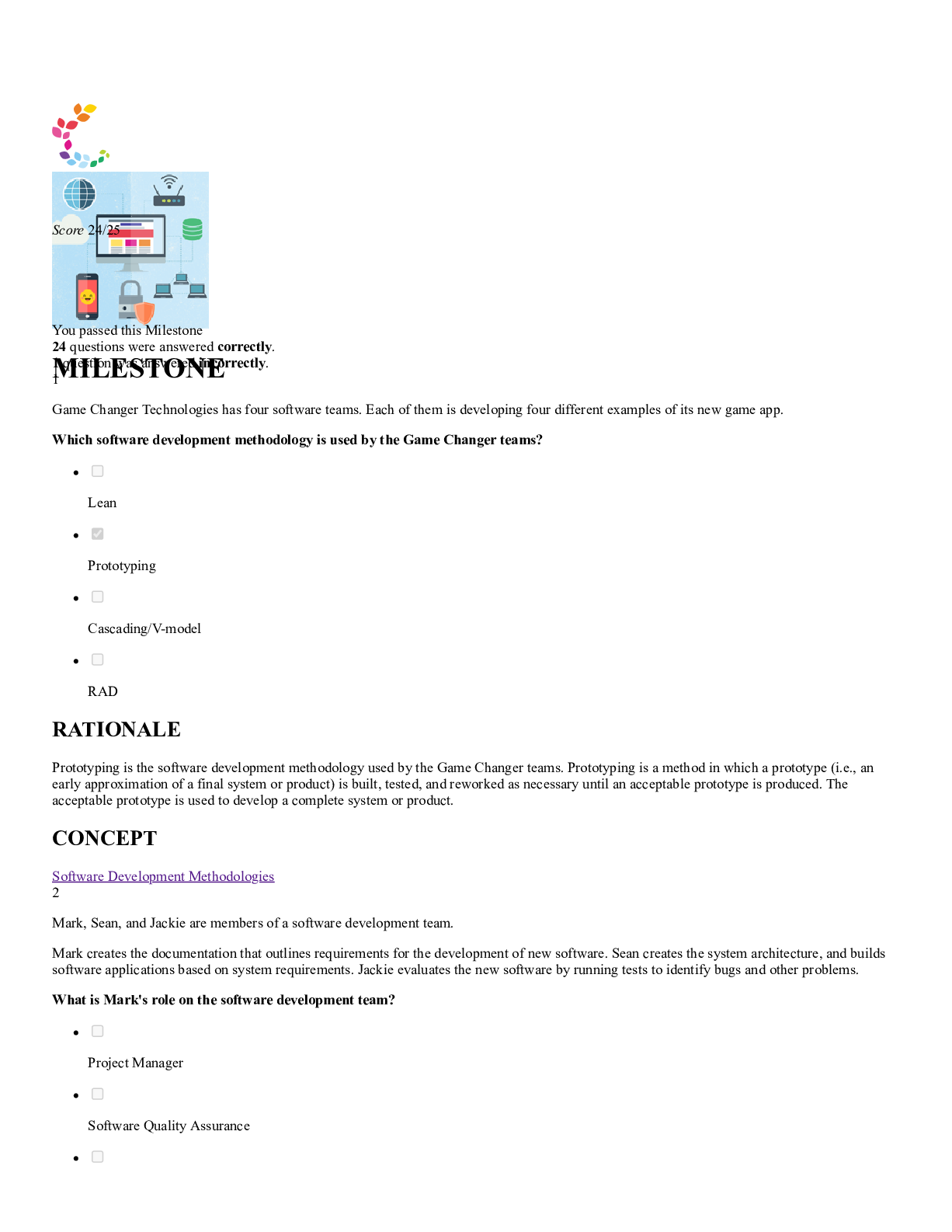
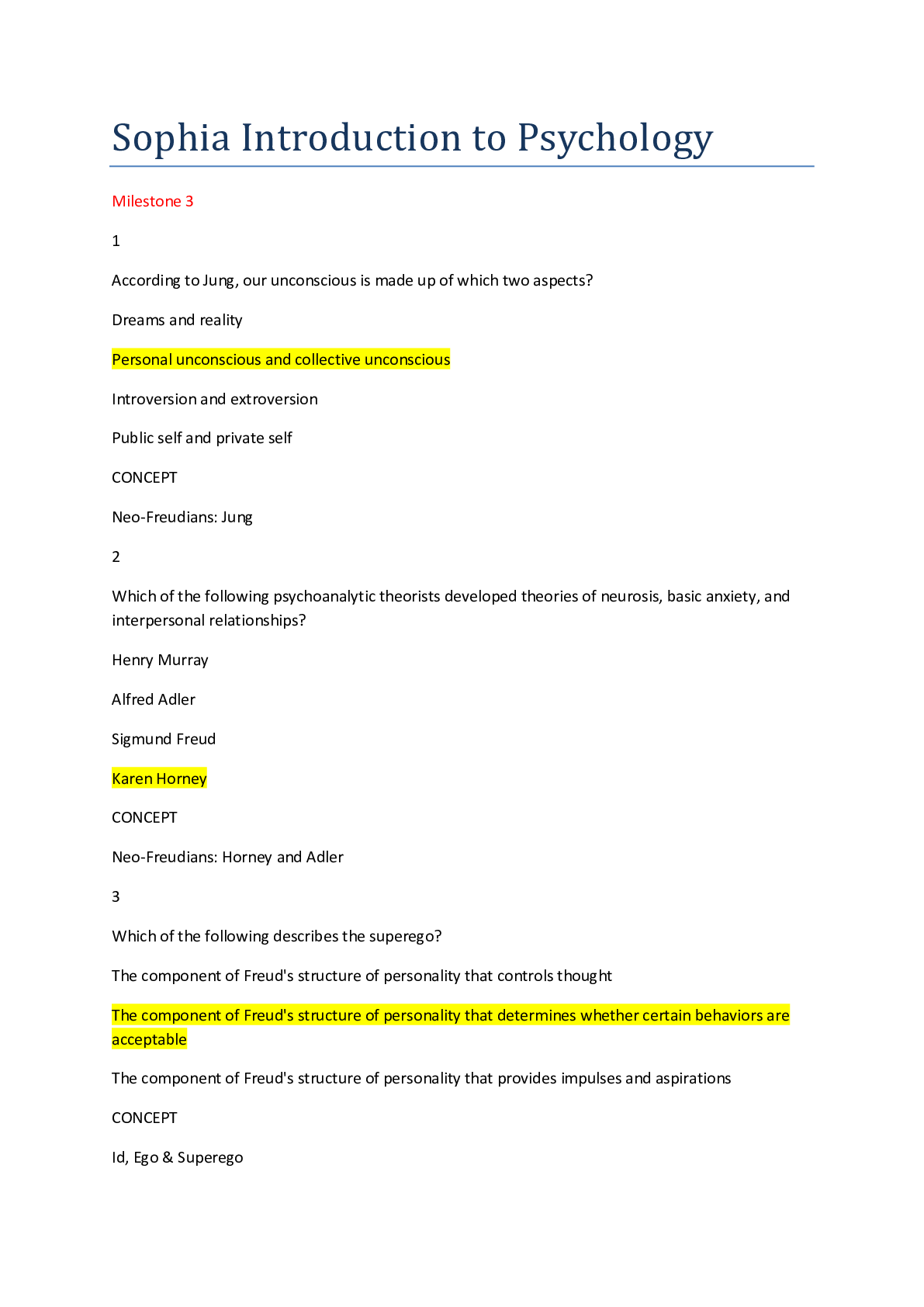
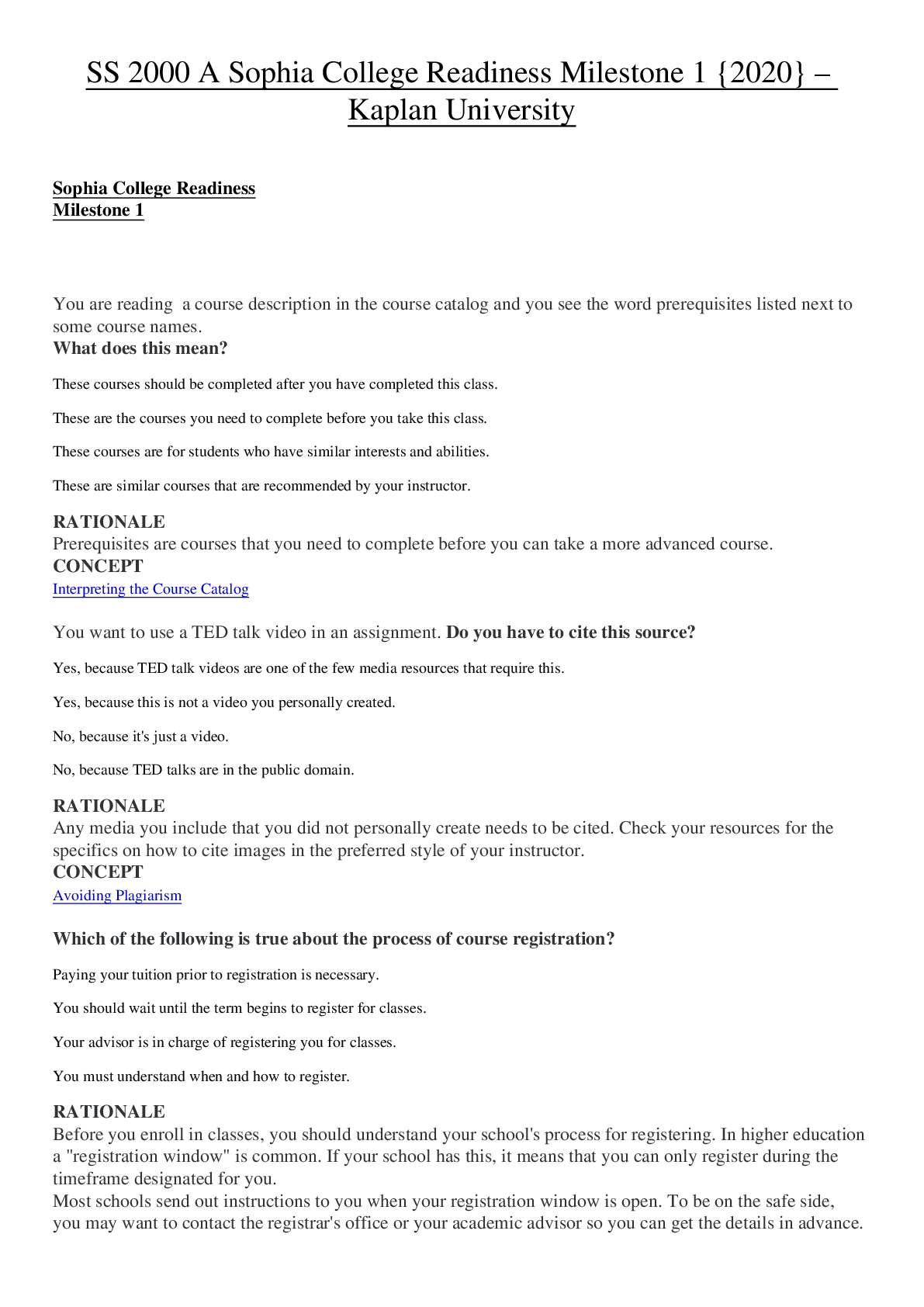
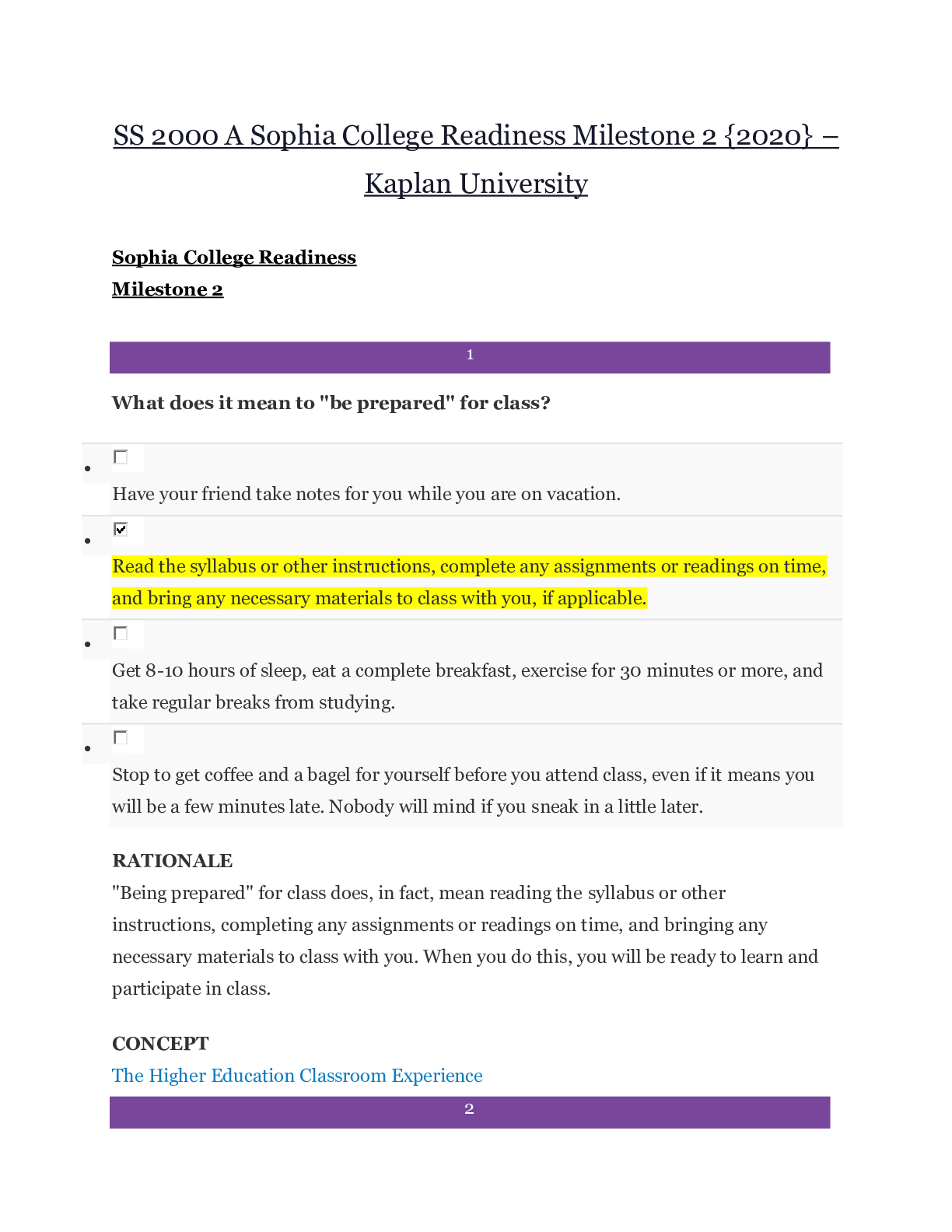
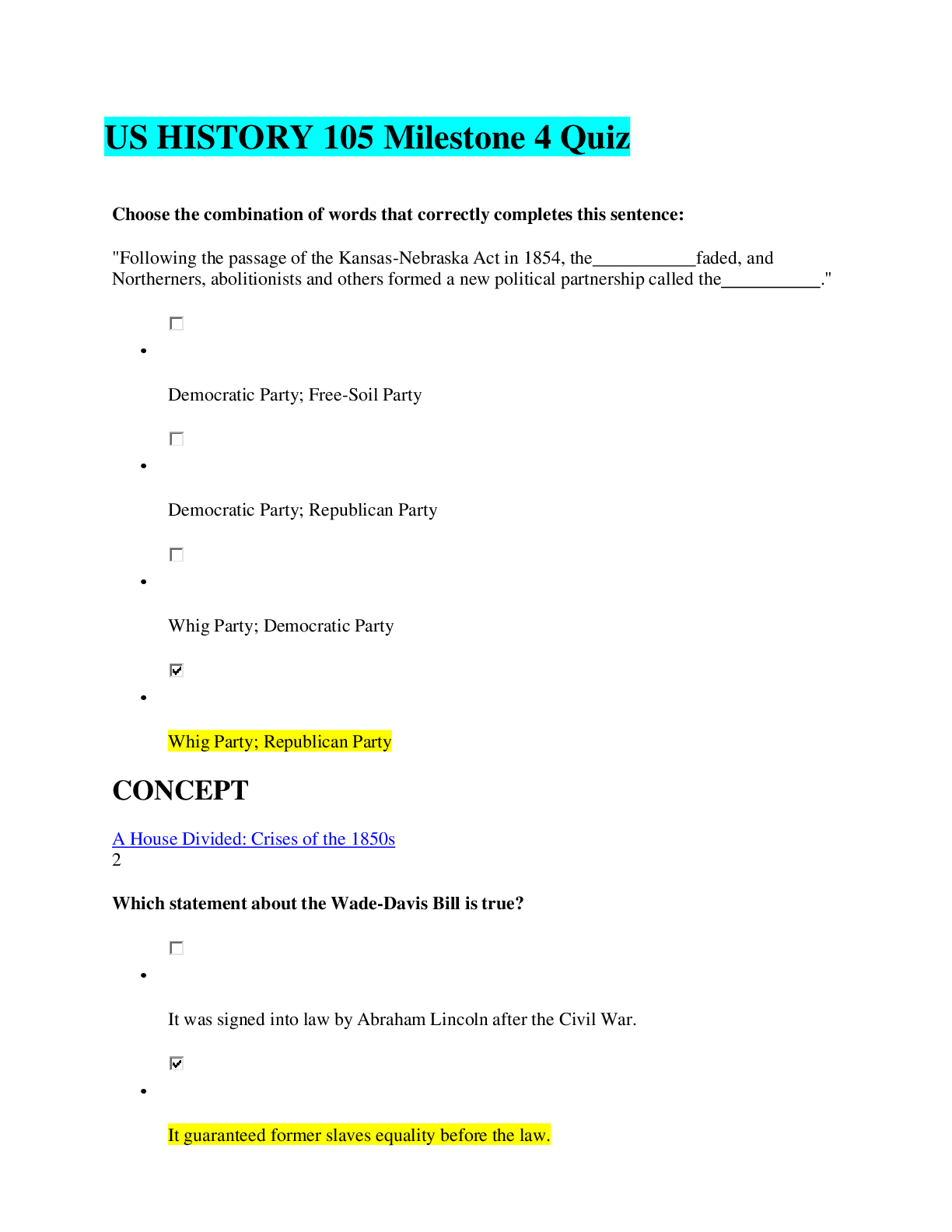
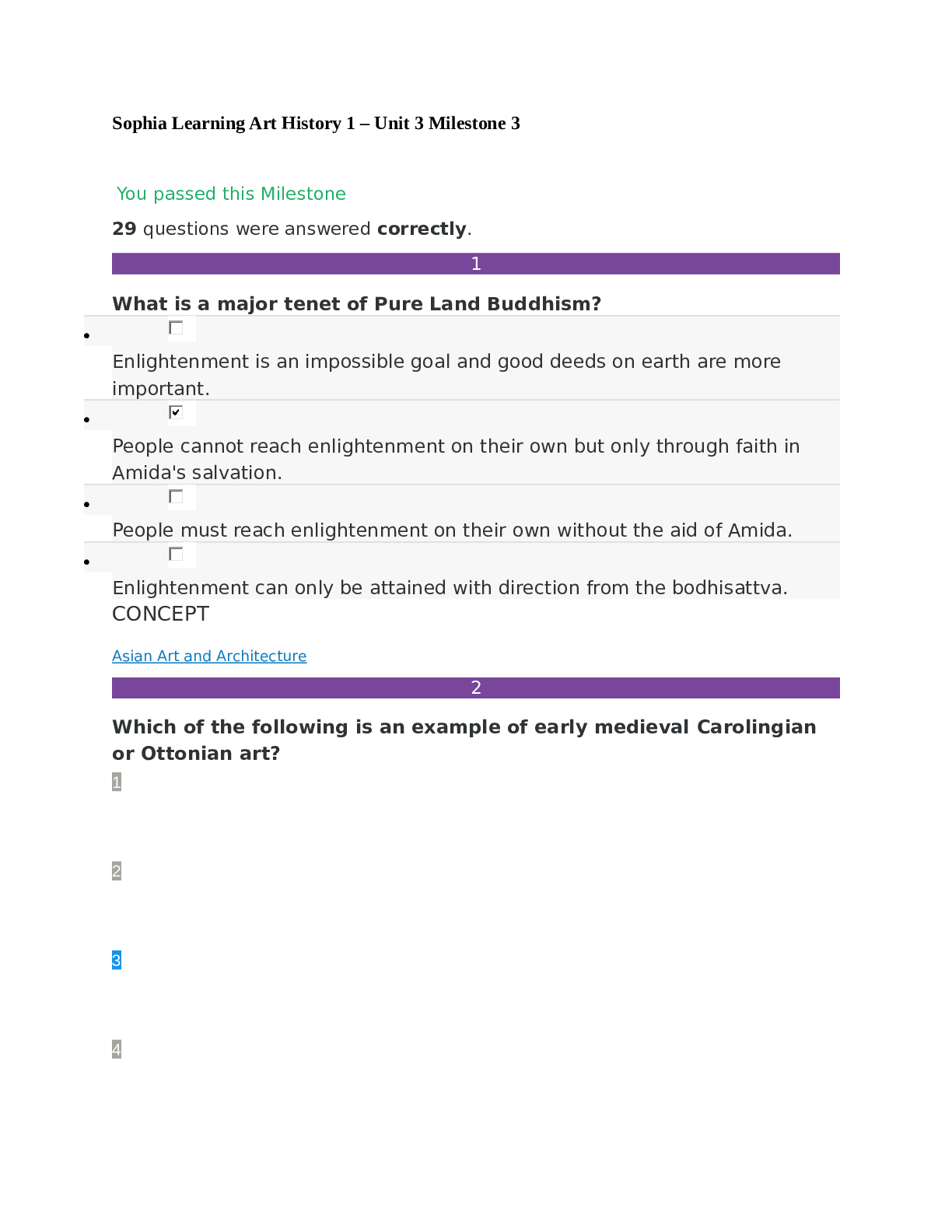
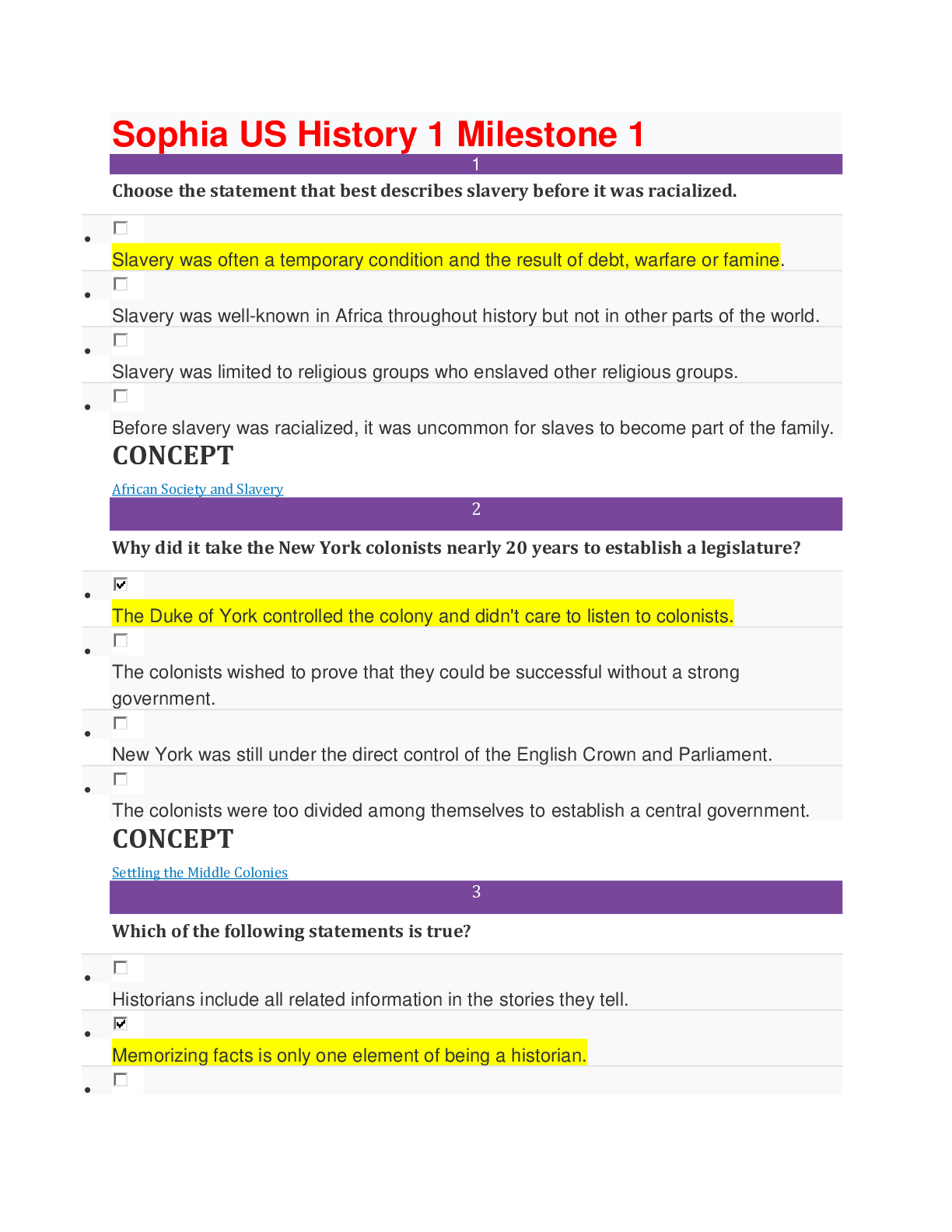
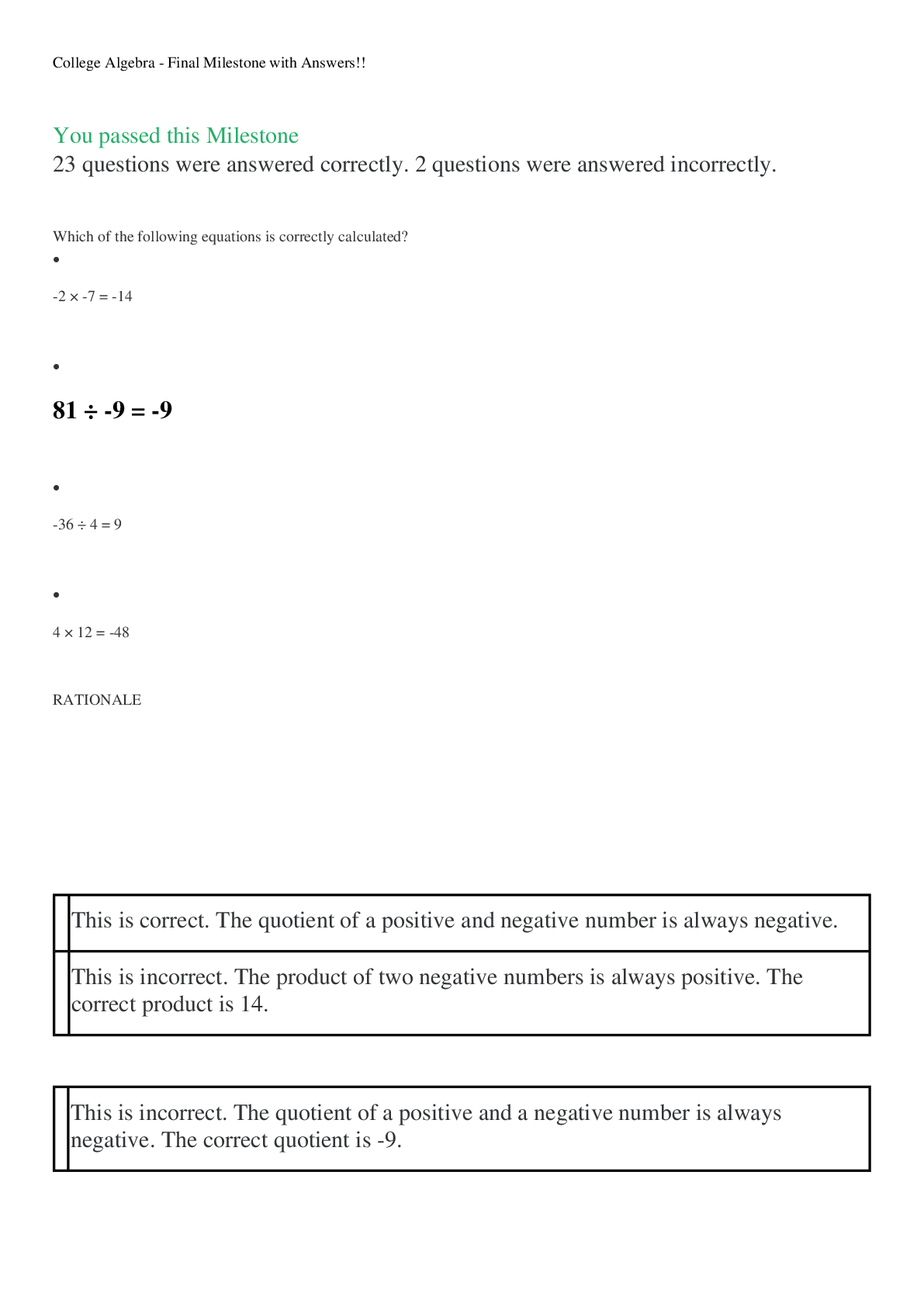
_removed.png)

